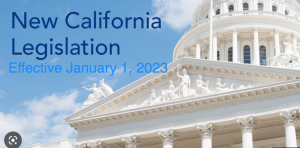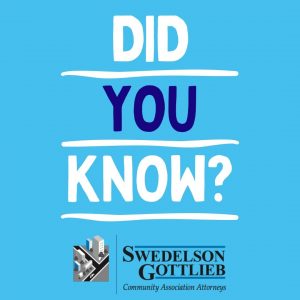 It is fall, and for most California community associations, it is budget season and boards and managers are in the process of preparing budgets for the 2022 fiscal year. Along with the next fiscal year’s budget, boards and managers need to be thinking of all of the disclosures that California law requires be made. That is why SwedelsonGottlieb annually publish this Checklist. The good news is that there are no major changes in the law relating to disclosures. But that does not mean that there are no other issues or disclosure requirements to consider.
It is fall, and for most California community associations, it is budget season and boards and managers are in the process of preparing budgets for the 2022 fiscal year. Along with the next fiscal year’s budget, boards and managers need to be thinking of all of the disclosures that California law requires be made. That is why SwedelsonGottlieb annually publish this Checklist. The good news is that there are no major changes in the law relating to disclosures. But that does not mean that there are no other issues or disclosure requirements to consider.
There are issues that we discussed last year that need to be considered, if the association has not already taken action, including the now required balcony inspections, election rules, rental restriction changes, and accounting for bad debt associated with COVID-19.
In addition, economists are projecting inflation to hit associations in the coming year. We have already seen increased cost for materials, utilities, and insurance. Employees all over the state are demanding higher wages to return to work, which will have a trickle-down effect in every service the association receives, be it janitorial, landscape, management, or pool. Associations really need to contact their service providers, contractors and insurance broker to discuss potential increases in next years fees and costs. To respond to homeowner outcry that usually follows an increase in assessments, boards should be prepared to educate homeowners on the rising costs and the plan to keep the association financially stable.
 HOA Law Blog
HOA Law Blog



 As it does just about every year, the California Legislature has made changes to the law impacting community association’s statewide. This article covers those changes effective January 1, 2023 and other recent changes in the law that are worthy of being mentioned, as they may apply to your California community association. We have included examples of the application of the new law.
As it does just about every year, the California Legislature has made changes to the law impacting community association’s statewide. This article covers those changes effective January 1, 2023 and other recent changes in the law that are worthy of being mentioned, as they may apply to your California community association. We have included examples of the application of the new law. It is fall, and for most California community associations, it is budget season and boards and managers are in the process of preparing budgets for the 2022 fiscal year. Along with the next fiscal year’s budget, boards and managers need to be thinking of all of the disclosures that California law requires be made. That is why SwedelsonGottlieb annually publish this Checklist. The good news is that there are no major changes in the law relating to disclosures. But that does not mean that there are no other issues or disclosure requirements to consider.
It is fall, and for most California community associations, it is budget season and boards and managers are in the process of preparing budgets for the 2022 fiscal year. Along with the next fiscal year’s budget, boards and managers need to be thinking of all of the disclosures that California law requires be made. That is why SwedelsonGottlieb annually publish this Checklist. The good news is that there are no major changes in the law relating to disclosures. But that does not mean that there are no other issues or disclosure requirements to consider. 
 SwedelsonGottlieb annually updates and publishes its Disclosure and Notice Checklist as a resource for Managers and Board Members of California Community Associations. The updated Checklist is 14 pages (there are a lot of things that California community associations are required to give notice of or disclose) and sets out what disclosures and notices California community associations are to provide to homeowners, when and how they are to be provided, as well as other considerations. Included is information regarding the Code requirements for the Annual Budget Report, the Annual Policy Statement, Fiscal Year End Disclosures, and other Additional Disclosures/Notices. We have included information regarding the recent changes to Civil Code Section 4041 relating to the solicitation of owner mailing addresses, etc. and the required New Management Disclosures.
SwedelsonGottlieb annually updates and publishes its Disclosure and Notice Checklist as a resource for Managers and Board Members of California Community Associations. The updated Checklist is 14 pages (there are a lot of things that California community associations are required to give notice of or disclose) and sets out what disclosures and notices California community associations are to provide to homeowners, when and how they are to be provided, as well as other considerations. Included is information regarding the Code requirements for the Annual Budget Report, the Annual Policy Statement, Fiscal Year End Disclosures, and other Additional Disclosures/Notices. We have included information regarding the recent changes to Civil Code Section 4041 relating to the solicitation of owner mailing addresses, etc. and the required New Management Disclosures.